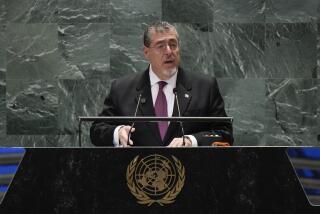West African States Approve Sending Peacekeepers to Liberia
- Share via
UNITED NATIONS — West African leaders formally committed Thursday to deploying the first peacekeeping troops to Liberia by Monday and said that President Charles Taylor would go into exile three days later.
The foreign ministers of Ghana, Nigeria and Togo and a top official from the Economic Community of West African States are heading to Liberia to inform Taylor in person of the decision and to help arrange his hand-over of power and departure for exile in Nigeria.
An ECOWAS communique issued Thursday declared that the vanguard forces’ first task would be to ensure that Taylor leaves the country. It also said that the leaders of the three warring parties -- two rebel groups and the government -- would be ineligible for the top positions in Liberia’s new government.
The long-awaited deployment is expected to quickly quell the civil war violence that has engulfed the West African nation since June. Taylor has pledged to step down once international troops arrive, but he has hedged on his promise several times since -- most recently on Thursday.
“President Taylor will not necessarily follow up this timetable” dictated by ECOWAS, his spokesperson said Thursday afternoon, saying that peace talks between the warring parties in Accra, Ghana, might yield a different conclusion.
It is unclear what will happen if Taylor resists.
After Nigeria announced that it would send 1,500 troops starting early next week, Ghana, Senegal, Mali and Togo together offered 3,250 more soldiers to create a nearly 5,000-strong force.
The United States has not yet committed soldiers, though three American ships carrying 2,300 Marines and 2,000 sailors are due to arrive off the coast of Liberia today or Saturday.
President Bush said in a news conference Wednesday that if the U.S. does send in ground troops, “the troop strength will be limited, and the time frame will be limited.”
To that end, the United States on Wednesday introduced a draft Security Council resolution authorizing a multinational force to follow the vanguard Nigerian battalions but requesting a U.N. peacekeeping force take over by Oct. 1. The draft also contains a contentious provision giving multinational forces immunity from prosecution by the International Criminal Court, which the U.S. opposes.
Although Security Council members agreed that they wanted to speed help to Liberia, the ICC clause proved to be a sticking point Thursday, with several delegations threatening to abstain if a compromise could not be found.
“We really want the resolution passed and appreciate the Americans coming forward with it,” a European diplomat said. “But the ICC exemption sets a precedent, and many delegations are afraid of that.”
Because the Nigerian battalions are not U.N. peacekeepers, deployment can begin before the resolution is passed. But diplomats are anxious to formalize the mission and approve an emergency diversion of funds from the peacekeeping mission in Sierra Leone to airlift the first battalion and sustain the vanguard troops until outside funding can be arranged.
The U.S. has offered $10 million in logistical support through an American military subcontractor, and the European Commission and Japan are discussing additional contributions.
U.S. reluctance to lead a multinational intervention had stalled action by other nations willing to help. Peacekeepers promised by West African leaders three weeks ago were delayed by disagreements over who would fund the mission and who should take the first steps.
Alarmed by the growing crisis and lack of action, U.N. Secretary-General Kofi Annan broke the stalemate by arranging for the U.N. peacekeeping operation in Sierra Leone to underwrite the operation.
Although the deployment will begin by Monday, it will take a week to 10 days to get the first battalion in place, said Jacques Klein, the U.N.’s special envoy to Liberia. Troops, equipment and supplies will be ferried from Sierra Leone to Monrovia, the Liberian capital, in helicopters that carry up to 20 people and Ukrainian aircraft that hold up to 50.
“The clock for Taylor starts ticking the moment the first boot is on the ground,” Klein said.
More to Read
Sign up for Essential California
The most important California stories and recommendations in your inbox every morning.
You may occasionally receive promotional content from the Los Angeles Times.








